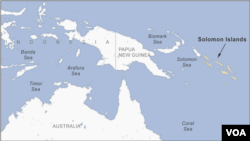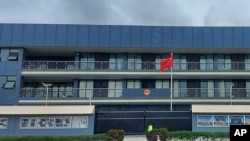The main street of Honiara, the capital of the Solomon Islands, is dominated by Chinese. There are several people on the street, signs with several characters, and almost every cash register standing at his counter.
According to locals, nearly all of his shops are owned by overseas Chinese. In the city's Chinatown, where he killed three people in the November riots, many denounced their ties to China,but the presence of China was almost non-existent. Unavoidable.
Recently, some locals have expressed frustration at the perception that the Solomon Islands' construction industry has been hijacked by China.
"A lot of Chinese companies, construction companies are coming into the country and there is no way to compete with them on price," Solomon Islands Chamber of Commerce Chairman Ricky Huo told VOA Mandarin. rice field.
"Just the size of these companies....they are huge. This is he one of the industries that are slowly infiltrating and being taken over," he said. I'm here.
In October 2019, Taiwan, a small but strategically important South Pacific island nation, severed diplomatic ties with Taiwan, established diplomatic relations with China, We signed an agreement with China's Belt and Road Initiative, a large-scale infrastructure project. It will spread from Asia to Europe.
In return, China pledged her $730 million in financial aid and acquired multiple infrastructure projects in the country. China's state-owned enterprises (SOEs), such as China Civil Engineering Construction Company (CCECC), China Railway Construction Company (CRCC) and China Harbor Engineering Company (CHEC), are building most of these projects in the Solomon Islands.
The stadium project for the 2023 Pacific Games is one example. Chinese state-owned company CCECC has won five of his seven infrastructure projects for stadiums in Honiara, which include facilities for many sports. At the same time, CCECC is building half of Honiara's highways. There is only one road,Japanese companies are building the other half
Bob Pollard, President of Local Company Coconut Pacific Solomon IslandsOil-Based Personals Care Products told VOA Mandarin that it believes it is unfair because local businesses cannot compete with these Chinese state-owned enterprises.

"I'm really worried. …level playing field. I don't think so," said Pollard. "Nobody knows how much subsidies they are getting from the Chinese government."
Some believe that China is only helping the island's economic development. The Solomon Islands consist of her six main islands and over 900 smaller islands in Oceania, covering approximately 28,400 square kilometers of land. The country achieved independence from Britain in 1978
``I don't think China has taken over the Solomon Islands. They are building public facilities and things like that," Walton Nazon, former Minister of Commerce, Industry and Employment, told VOA. Naezon is currently Director ofGold Ridge Mining. This is an open pit mining operation about 30 kilometers from Honiara.
"It's good for the country. I'm happy that most of the Chinese investments here are in public property. They're grants, not loans," he said. rice field.
A report of the Council on Foreign Relations noted China's interest in the region.
"The Chinese government sees the Pacific Islands as an important component of its Belt and Road Initiative (BRI),"says the report.It is the so-called air silk road cargo hub.
Anyone can see China's influence here in Honiara, but few know how these Chinese companies operate.
Her consultant Michelle Lam is an overseas Chinese born in the Solomon Islands to Hong Kong immigrants who came to teach English in the 1960s.

"They [overseas Chinese] are everywhere. They run shops, they have businesses, they move around. I think this is just people doing their jobs," Lam told VOA. "When people talk about China's existence, they are here to do certain jobs ( I think you mean China's SOE (state-owned enterprise)," said Lam, who previously worked for the China Harbor Engineering Company. said it had to do with the way state-owned enterprises in China operate.
"They said they were just here to do some construction work. They don't mix at all," she told VOA. When I was in China Harbor, the camp was very tight.They bring people to work.They (workers) basically work, eat, sleep, work, eat, sleep They (the company) do not tolerate socializing at all," she added.
Liu Ze, secretary of the Solomon Islands China Business Council, told VOA Mandarin that Chinese workers arrived more than a century ago when the country was a British protectorate. .
According to Liu, five people had arrived from Guangdong and were brought in to work as cooks and carpenters. According to the Solomon Encyclopedia, by 1914 a person named Kwon Chung was doing business in the colonial capital of Tulagi. 55 to 193.
"Most of them are from Guangdong, China. They came with the British over 100 years before him and expanded their business here in Honiara," he said. rice field. The British declared the island a protectorate primarily to forestall the threat of French annexation
Consolidation began in the late 1950s and 1960s, according to the Solomons Encyclopedia, where they entered colonial society, stripped of their British citizenship, and came to control much of the protectorate's retail trade, leading to Honiara and major became dominant in rural towns.Solomon Encyclopedia


